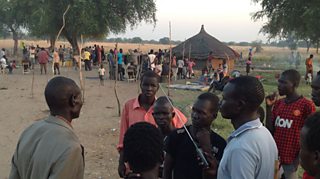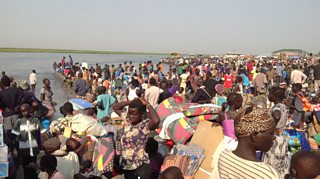Rumours and fear in South Sudan
Manyang David Mayar
Senior Producer, �������� Media Action in South Sudan
Tagged with:

But information gleaned from news reports or phone calls with relatives all too often fuelled terrible rumours.
While I was in the makeshift camp in late December, the men of our group gathered each day under a big tree to talk about new developments, shifting their position with the shade, frightened or soothed by what they heard from each other.
Women, meanwhile, usually sat under a separate tree and became restless when they heard the men’s conversation.
Panic and fear
Deborah Anai, a mother who was breastfeeding her baby, told me she was very frightened when she heard a rumour about a possible attack by the White Army – an army that is loyal to Riek Machar, the former vice president and head of the forces who have been fighting government troops for the past month. (The militia is known as the White Army because of the white ash they put on their skin.)
“My intestines twist whenever I hear people talk of attackers coming,”Anai said.
“You could hear people saying ‘The White Army is coming, the White Army has attacked a neighbouring village.”
I also met a young man, a 20-year-old student, who told me how he lost his appetite and stopped eating when rumour of another attack started to circulate.
Isolated and afraid
Like most hideouts, ours was in an area that’s out of reach for local newspapers or radio stations in Juba, about 130 miles away. The local FM stations in Bor had also already been looted and reporters forced to leave.
The only news outlets available to displaced people are United Nations radio station Miraya FM and the �������� World Service.
But while they report what officials from both side of South Sudan’s conflict are saying about the peace efforts, they don’t broadcast the immediate information people in hideouts like mine desperately want to know - details about when the armies would reach their areas of the bush.

Thousands fleeing Bor by boat.
No reliable information
Even in the capital Juba, which has experienced four weeks of relative calm, rumours have led many people to flee to neighbouring border towns or refugee camps in Uganda.
According to the United Nations, nearly 500,000 civilians have fled their homes over the past month – and they’re all desperate for reliable, trustworthy information and news.
People across South Sudan simply don’t trust what the local media tells them, as it solely depends on official sources to get news – news which is usually twisted to suit the political parties’ agendas.
Social media, meanwhile, has also failed to fill the information gap. People's comments on Facebook, the most popular social media platform across the whole country, seem to only bring more division, as people on each side of the conflict share unreliable information.
Instead, people only trust what they hear from friends and relatives.
And as long as that continues, fear and confusion will continue to dominate daily conversations in both the bush hideouts and towns of South Sudan.
Related links
Follow �������� Media Action on and
This blog was updated on Thursday 16 January to include the comments on social media.
